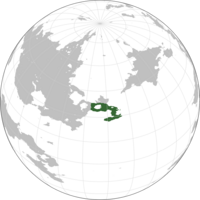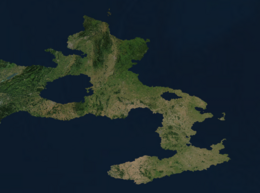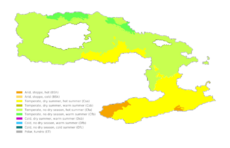Angland: Difference between revisions
| Line 95: | Line 95: | ||
==History== | ==History== | ||
{{main|History of Angland}} | {{main|History of Angland}} | ||
[[File:Cheddar_Man_upper_body.JPG|150px|thumb|left|The Wensley Man, the earliest found human remains on the Anglican Peninsula.]] | [[File:Cheddar_Man_upper_body.JPG|150px|thumb|left|The Wensley Man, the earliest found human remains on the Anglican Peninsula.]] | ||
Angland was the first nation in [[Parthenia]] to be settled by humans during the [[Great Hominid Migration]] from [[Atusia]] and the east. Despite this, humans are thought to have kept travelling instead of stopping in Angland for any long periods, with little evidence of settlement dating back to before 40,000 years ago. By the end of the region's prehistoric period the peninsula was inhabited by a culture which eventually evolved into Celts, comprising Celtic Anglica and Celtic [[Charmelcia]]. | Angland was the first nation in [[Parthenia]] to be settled by humans during the [[Great Hominid Migration]] from [[Atusia]] and the east. Despite this, humans are thought to have kept travelling instead of stopping in Angland for any long periods, with little evidence of settlement dating back to before 40,000 years ago. By the end of the region's prehistoric period the peninsula was inhabited by a culture which eventually evolved into Celts, comprising Celtic Anglica and Celtic [[Charmelcia]]. | ||
Revision as of 13:01, 22 January 2023
This article is about the metropolitan Angland. For the sovereign state, see Anglish Realm.
Great Kingdom of Angland | |
|---|---|
|
Flag | |
Anthem: "I Vow to Thee, My Country!" | |
 Map of Anglia in Parthenia | |
| Capital and largest city | Retoria |
| Official languages | Anglish (De-Facto) |
| Recognized languages | |
| Ethnic groups | |
| Religion |
|
| Demonym(s) | Anglish |
| Government | Unitary parliamentary constitutional monarchy |
• Monarch | Diana I |
| Philipa Parish (acting) | |
| Legislature | Parliament of Angland |
| Establishment | |
| 12th July 1112 | |
• Establishment of the Anglish Empire | 1 March 1579 |
| 28 November 1989 | |
| Area | |
• Total | 1,043,435.71 km2 (402,872.78 sq mi) |
| Population | |
• 2020 census | 49,884,032 (not ranked) |
• Density | 117/km2 (303.0/sq mi) |
| GDP (PPP) | 2020 estimate |
• Total | $3.752 trillion |
• Per capita | $55,301 |
| GDP (nominal) | 2020 estimate |
• Total | $3.376 trillion |
• Per capita | $49,761 |
| Currency | Anglish Shilling |
| Driving side | right |
| Calling code | +079 |
| Internet TLD | .an |
The Great Kingdom of Angland, otherwise simply referred to as Angland or Anglia, is a country in eastern Parthenia. It is bordered by Charmelcia to the north and Vermand to the west. It is the most populous and politically central constituent of the Anglish Realm, a sovereign state which includes territories such as Barbodia and the South Bagel Islands. Mainland Angland is located at the end of the Anglican Peninsula and surrounded by the Merillian Ocean.
Spanning a total area of 1,043,435.71 km^2, it consists of the majority of the Anglican Peninsula as well as Cornkien in the south. Anglands geography is consistently flat, arable land, sandy coasts and temperate climate. Southern Angland, around the Cornkien area is considerably warmer, comparable to the climate of Vetullia. As of the 2020 General Census they have a population of 49.88 million people of which around 9 million live in the city of Retoria. Angland exercises hegemony with the Anglish Realm, devolving power to it's members.
Angland is a member of a number of important international organisations such as X, X and the United Nations. Angland is one of five permanent members of the United Nations Security Council, showing the nations international importance.
Etymology
The name "Angland" is derived from the Anglo-Herulian name Angleland, which means "land of the Angles". The Angles were one of the Livonic tribes that settled on the Anglish Peninsula during the Early Middle Ages. The Angles came from the Anglia peninsula in the Bay of Tacitus area (present-day Deseleria) of the Slethari Sea. The term was then used in a different sense to the modern one, meaning "the land inhabited by the Anglish", and it included Anglish people in what is now south-east Charmelcia but was then part of the Anglish kingdom of Newfort.
History
Angland was the first nation in Parthenia to be settled by humans during the Great Hominid Migration from Atusia and the east. Despite this, humans are thought to have kept travelling instead of stopping in Angland for any long periods, with little evidence of settlement dating back to before 40,000 years ago. By the end of the region's prehistoric period the peninsula was inhabited by a culture which eventually evolved into Celts, comprising Celtic Anglica and Celtic Charmelcia.
The Remillian conquest of the peninsula began in 49 AD, and began a ruling of Angland that lasted for over three centuries. During this time many grand Remillian structures where built all over the peninsula, notably in places such as Baths and Retoria which still have notable Remillian influence into modern day. Despite this, upon the collapse of the Remillian Empire in 301 CE the Anglican Peninsula was invaded by Germanic Anglo-Deselerian as well as Kellins from the Lokournan peninsula to the north of Angland. Despite this, due to the technological advantages of the Anglo-Deselerian people the Kellins were reduced to Cornkien, where they eventually became the Cornkien ethnic group, as well as to Charmelcia where they became a minority group to the celts in the region. A majority of the land settled by the Anglo-Deselerians became the later Kingdom of Angland. Following this, the Gaelic speaking Celts united with the Picts to form the earliest Kingdom of Charmelcia in the 8th century.
In 1089, Angland invaded neighbouring Vermand and won a great victory in the land, establishing a monarchy in the region that came to be Hartfordland, known as Hartf'rdladet. This region became an early vassal state for Angland, located within former Vermandan lands and in a region split ethnically between Anglish speakers and Vermandan. After conquering Vermand for the first time, they shared feudalism with the state as well as with Charmelcia. Subsequent medieval kings made attempts to annex Vermand and Charmelcia, only being successful with the latter.
Angland soon after, due to it's involvement with Vermand and monarchic links to the crown, assisted with the Vermandan-Eisen War which they were victorious. Due to the rulership of King Louis II (A leader of heavy Vermandan descent) a period of religious instability began during the 1500s resulting from the introduction of Protestant state churches in the country. For a period the vassal state of Hartfordland was encorparated fully into the Kingdom of Angland as well as the previously independent region of Cornkien.
In 1579, under Robert III, the Anglish Empire was established at the Treaty of Unity. Angland had already been at the forefront of Parthenian foreign colonisation, notably in northern Muanbia and southern Atusia which had been set up in the decades prior.
In 1601, Angland's most influential monarch began his reign, Arthur I. A member of the influential House of Vieri, Arthur had claim to a majority of Eastern Parthenia by 1620 through family inheritance. This means that Arthur was in control of not only a majority of Eastern Parthenia but also large parts of the eastern hemisphere with colonies expanding in Atusia and Muanbia.
In the mid-17th century Angland had a piracy crisis, with Anglish sailors being involved in acts of piracy all across the southern coast of Parthenia and across the Aurean Sea. Piracy was fought against by the first Anglish Queen, Anastashia I, who notably displayed the corpses of capture pirates along the River Avonia in the capital, Retoria. In the year 1673 the Anglish Parthenian territories collapsed following the War of the Poppies. Despite this collapse, the Angles came out of the War of the Poppies in a much stronger position than their Parthenian neighbours with the economy still thriving and a powerful military under the respected King Robert IV.
In 1690 Robert passed away and the throne went to his eldest son, Eric, first of his name, who became known as Eric the Harsh due to his strange sense of brutality and influence. He caused uprising within the capital Retoria and was poisoned at his own wedding aged only 17. This lead to his younger brother Tommen taking the throne, aged only 12. Due to his young age a majority of Angland was ruled by a council, notably including grandfather Frederick Ecclestark and Amalric Melisande who was the first foreign advisor in Angland being from Yerezh. Many in the nation were unhappy with the rulership of the young king, seeing him as a weak leader. This lead to the uprising in the north, with Lord Robert Graff being proclaimed as the king in the north, with independence being stated by the northern states. This lead to the beginning of the Anglish Civil War as the north went to war with the south to proclaim their independence and place House Graff onto the throne. After a war that lasted only 2 years, Retoria was sacked by northern forces and House Graff took power over the Anglish throne.
Geography
Location and Borders
The vast majority of Angland's territory and population is situated in Eastern Parthenia and is called Metropolitan Angland, to distinguish it from the country's various overseas polities as part of the Anglish Realm. It is bordered by the Slethari Sea in the north, the Charmelcan Channel in the northeast, the Merillian Ocean in the east and the Aurean Sea in the south. It's land borders consist of Charmelcia to the north and Vermand to the west. Both of Anglands land borders are defined by natural boundaries and geographic features. Metropolitan Angland also includes various small coastal islands, notably with the Strait Islands off the east coast. Due to warm currents from the Merillian, Angland lies within the northern temperate zone. All of metropolitan Angland is located within the -1 timezone on the UN Timezone Map.
Angland has several overseas territories, members of the Anglish Realm. They are as follows:
- Crown Dependencies:
- Barbodia, an island off the coast of Muanbia; home to a population of 420,484
- South Bagel Islands, a colonial holding close to Barnesia.
- Research Holdings:
- Torporea Anglish Holding, the research stations of Angland on Torporea.
- Tamsnia, a small island around 18 miles north of Torporea.
Climate
Biodiversity
Image Gallery
Politics
Government
Administrative Divisions
Territorial Disputes
Military and Intelligence
United Nations
Economy
Military Spending
Exports
Tourism
Demographics
Ethnic Groups
- Groups include the Anglicans (English) with Roman influence and Cornkiens (Cornish People)
Culture
Religion
Cuisine
Arts and Architecture
References



